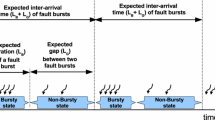Abstract
Hard real-time systems are characterized by the execution of tasks under strict time constraints. The importance of meeting a task execution deadline makes the scheduling scheme a central issue for the correctness and reliability of such systems. While reliability is one of the objectives, it cannot be guaranteed that any system be free from faults during its operational lifetime. Thus, in systems performing critical activities, measures that provide fault tolerance should be included [2].
This paper focuses on the design and evaluation of a highly reliable integrated system which consists of local and global task schedulers. Our approach to error detection and recovery problems is to utilize safety times associated with the scheduled tasks and combine local and global recovery techniques. This approach supports system level error detection and recovery for the local scheduler and affected tasks. The performance of the system in terms of the number of recovered tasks is evaluated and the results are presented.
Preview
Unable to display preview. Download preview PDF.
Similar content being viewed by others
References
G.S. Alijani and H.F. Wedde, “A Three-Phase Scheduling Scheme in Hard Real-Time Environments”, Proc. of First Great Lakes Computer Science Conference, October 1989.
T. Anderson and J.C. Knight, “A Framework for Software Fault Tolerance in Real-Time Systems”, IEEE Transactions on Software Engineering, Vol.SE-9, No. 3, May 1983.
S. Balaji, et al., “Workload Redistribution for Fault Tolerance in a Hard Real-Time Distributed Computing System”, Proc. 19th Sym. on Fault-Tolerance Computing, June 1989.
S.R. Biyabani, J.A. Stankovic and K. Ramamritham, “The Integration of Deadline and Criticalness in Hard Real-Time Scheduling”, Proc. Real-Time Sys. Sym. December 1988.
T.L. Casavant and J.G. Kuhl, “Effects of Response and Stability on Scheduling in Distributed Computing Systems”, IEEE Software Engineering, Vol. SE-14, No. 2, February 1988.
F.G. Coffman and P.J. Denning, “Operating Systems Theory”, Prentice-Hall inc. Englewood Cliffs, New Jersey, 1973.
D.L. Eager, E.D. Lazowska and J. Zahorjan, “Adaptive Load Sharing in Homogeneous Distributed Systems”, IEEE Transaction of Software Engineering, Vol. SE-12, No. 5, May 1986.
M.R. Garey and D.S. Johnson, “Two-Processor Scheduling with Start-Time and Deadlines”, SIAM Journal, Comp., Vol. 6, No. 3, 1977.
R.L. Graham et al., “Optimization and Approximation in Deterministic Sequencing and Scheduling: A Survey”, Ann. Discrete Math., Vol. 5, 1979.
A. Hac and X. Jin, “Dynamic Load Balancing in a Distributed System using a Decentralized Algorithm”, International Conference on Distributed Computing Systems, September 1987.
K.H. Kim, “An Approach to Experimental Evaluation of Real-Time Fault-Tolerant Distributed Computing Schemes”, IEEE Transactions on Software Engineering, Vol. SE-15, No. 6, June 1989.
J.P. Lehoczky, L. Sha and J.K. Stronider, “Enhanced Aperiodic Responsiveness in Hard Real-Time Environments”, Proc. real-Time Sys. Sym, December 1987.
D.W. Leinbaugh and M-R, Yamini, “Guaranteed Response Times in a Distributed Hard Real-Time Environment”, IEEE Transactions on Software Engineering, Vol. SE-12, No. 12, December 1986.
F.C.H. Lin and R.M. Keller, “The Gradient Model Load Balancing Method”, IEEE Transactions on Software Engineering, Vol. SE-13, No. 1, January 1987.
J.W.S. Liu, K-j Lin and S. Natarajan, “Scheduling Real-Time Periodic Jobs using Imprecise Results”, Proc. Real-Time Sys. Sym. December 1987.
A.K. Mok and M.L. Dertouozs, “Multiprocessor Scheduling in a Hard Real-Time Environment”, Proc 7 th Texas Conference on Computing Systems, November 1978.
J.A. Stankovic, K. Ramamritham and S. Cheng, “Evaluation of Flexible Task Scheduling Algorithm for Distributed Hard Real-Time Systems”, IEEE Transactions on Computers, Vol. c-34, No. 12, December 1985.
H.F. Wedde and G.S. Alijani, “MELODY: A Distributed Adaptive File System for Handling Real-Time Tasks in Unpredictable Environments”, to appear in Journal of Real-Time Systems.
Author information
Authors and Affiliations
Editor information
Rights and permissions
Copyright information
© 1991 Springer-Verlag Berlin Heidelberg
About this paper
Cite this paper
Alijani, G.S., Wedde, H.F. (1991). Enhanced reliability in scheduling critical tasks for hard real-time distributed systems. In: Dehne, F., Fiala, F., Koczkodaj, W.W. (eds) Advances in Computing and Information — ICCI '91. ICCI 1991. Lecture Notes in Computer Science, vol 497. Springer, Berlin, Heidelberg. https://doi.org/10.1007/3-540-54029-6_204
Download citation
DOI: https://doi.org/10.1007/3-540-54029-6_204
Published:
Publisher Name: Springer, Berlin, Heidelberg
Print ISBN: 978-3-540-54029-8
Online ISBN: 978-3-540-47359-6
eBook Packages: Springer Book Archive




